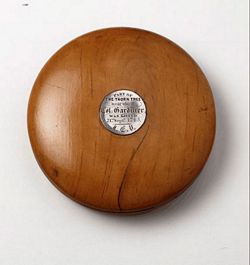Thorntree Boughs to Snuff?
What the archives say ...but ...
This snuff box was made from part of a thorn tree near which Colonel James Gardiner was killed at the Battle of Prestonpans on 21 September, 1745. Gardiner, who owned the nearby Bankton House was the commander of a troop of government dragoons.
SCRAN Record details
To search on related items, click any linked text below.
Online ID: 000-100-001-560-C
Image Rights Holder: National Museums Scotland
Project: 0098: National Museums Scotland
Ref: National Museums of Scotland H.NQ 31
Date: 18th or 19th century c. 1745
Material: Wood, thorntree Dimensions: 25 mm H x 72 mm Dia
Subject: Tobacco pipes, snuff boxes (NMAS Classification)
If the tree was not actually felled until 1931 .... this fine snuff box must have been made from a living bough ... any and all comments please to waukin@battleofprestonpans1745.org
click on snuff box to enlarge image

____________________________________________________
P.S. Trust Supporter Elizabeth Dods from Canada reminds us [below] that there was more than one bough/ limb to the Thorntree and the Earl had but one although most tales have the Earl's 'tree' being felled and passed around for souvenirs... Indeed we in the Trust are proud to own one such piece shown HERE.
The letter below was written in response to a newspaper feature called the 'Lothians Quiz' by William Wright. William lived at the orchard and farm now known as 'Preston Park' [aka Orchard Cottage] until 1929. My great great grandfather, also known as William Wright, grandfather of the writer William below, had moved into this house in 1857/58.
Letter to Editor of the Haddington Courier
Tree That ... Battle Site
Unfortunately, I missed your Lothians Quiz of a week ago. I have no record of the date when the stumps of the old thorn tree which marked the site of the Battle of Prestonpans were cut down - perhaps unimportant - but I can vouch for the accuracy of G.T.'s location of the tree.
During my father's time and my own as tenants of the Preston land of the Merchant Company Education Board, two of the old tree's limbs were just within the original fence-line of our property, and the third limb was on the farm of Thorntree Mains belonging to the Earl of Wemyss and March. The water tank erected very close to the tree many years ago serves the purpose of feeding the boilers of locomotives on the mineral railway alongside, and the smoke and steam caused a premature decay of the tree.
William Wright, Seton West Mains, Tranent
________________________________________________________
Walk through Prestonpans in preparation for the writing of the Third Statistical Accounts for Scotland,
207–212 of Volume I of the Transactions
“On both occasions the thorn tree was visited. The first visit was made on 20th September 1924 under the leadership of the late W. B. Blaikie, LL.D., a well-known authority on the “Forty-five”. The second took place five years afterwards (on 21st September 1929) and included a visit to Preston Tower and Cross, Hamilton House and Northfield House under the leadership of Mr James S. Richardson. The visit to the thorn tree was under the guidance of Mr Richardson and Mr Alexander Burnett. On the first visit it was noted that only one of the three limbs of the tree remained and it was dead; on the second Mr Burnett “gave a clear and concise account of how the dead and blackened stump which the members saw before them, had a special interest in connection with the history of the battle”. On the second visit a suggestion was considered that a Memorial be placed on the site of the thorn tree. The movement to erect a suitable Memorial Cairn gathered way. The tree was cut down by permission of the Earl of Wemyss as owner, the best portion of the trunk being presented to the Naval and Military Museum at Edinburgh Castle. ...
_________________________________________________________
Published Date: January 12th 2009
|





